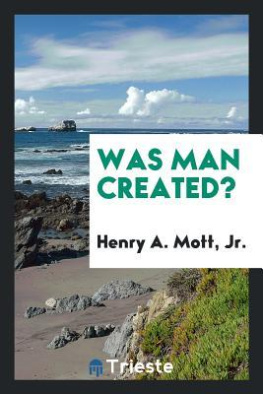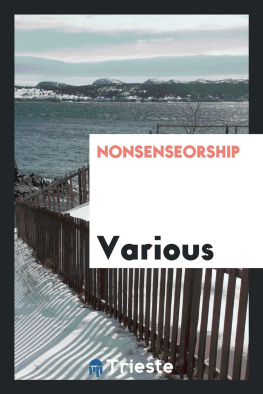The Project Gutenberg EBook of Was Man Created?, by Henry A. Mott
This eBook is for the use of anyone anywhere at no cost and with
almost no restrictions whatsoever. You may copy it, give it away or
re-use it under the terms of the Project Gutenberg License included
with this eBook or online at www.gutenberg.org
Title: Was Man Created?
Author: Henry A. Mott
Release Date: November 8, 2009 [EBook #30429]
Language: English
*** START OF THIS PROJECT GUTENBERG EBOOK WAS MAN CREATED? ***
Produced by Marilynda Fraser-Cunliffe, Stephanie Eason,
and the Online Distributed Proofreading Team at
http://www.pgdp.net.
FOSSIL MAN OF MENTONE. (From Popular Science Monthly, October, 1874.)
WAS MAN CREATED?
BY
HENRY A. MOTT, Jr. , E.M., Ph.D. , Etc. ,
Member of the American Chemical Society, Member of the Berlin Chemical Society, Member of the New York Academy of Sciences, Member of the American Association for the Advancement of Science, Member of the American Pharmaceutical Association, Fellow of the Geographical Society, Etc., Etc.
Author of the "Chemists' Manual," "Adulteration of Milk," "Artificial Butter," "Testing the Value of Rifles by Firing under Water," Etc., Etc.
NEW YORK:
GRISWOLD & COMPANY,
150 Nassau Street .
1880.
Copyright by
HENRY A. MOTT, Jr. ,
1880.
Trow's
Printing and Bookbinding Co. ,
205-213 East 12th St.,
NEW YORK.
Electrotyped by Smith & McDougal , 82 Beekman Street, N. Y.
PREFACE.
This work was originally written to be delivered as a lecture; but as its pages continued to multiply, it was suggested to the author by numerous friends that it ought to be published in book-form; this, at last, the author concluded to do. This work, therefore, does not claim to be an exhaustive discussion of the various departments of which it treats; but rather it has been the aim of the author to present the more interesting observations in each department in as concise a form as possible. The author has endeavored to give credit in every instance where he has taken advantage of the labors of others. This work is not intended for that class of people who are so absolutely certain of the truth of their religion and of the immortality that it teaches, that they have become unqualified to entertain or even perceive of any scientific objection; for such people may be likened unto those who, "Seeing, they see, but will not perceive; and hearing, they hear, but will not understand."
This work is written for the man of culture who is seeking for truthbelieving, as does the author, that all truth is God's truth, and therefore it becomes the duty of every scientific man to accept it; knowing, however, that it will surely modify the popular creeds and methods of interpretation, its final result can only be to the glory of God and to the establishment of a more exalted and purer religion. All facts are truths; it consequently follows that all scientific facts are truthsthere is no half-way housea statement is either a truth or it is not a truth, according to the law of non-contradiction. If, therefore, we find tabulated amongst scientific facts (or truths) a statement which is not a fact, it is not science; but all statements which are facts it naturally follows are truths, and as such must be accepted, no matter how repulsive they may at first seem to some of our poetical imaginings and pet theories. We cannot help but sympathize with the feelings which prompted President Barnard to write the following lines, still we will see he was too hasty: "Much as I love truth in the abstract," he says, "I love my hope of immortality more." * * * He maintained that it is better to close one's eyes to the evidences than to be convinced of the truth of certain doctrines which he regards as subversive of the fundamentals of Christian faith. "If this (is all) is the best that science can give me, then I pray no more science. Let me live on in my simple ignorance, as my fathers lived before me; and when I shall at length be summoned to my final repose, let me still be able to fold the drapery of my couch about me, and lie down to pleasant, even though they be deceitful, dreams."[1] The limitations to the acceptance of truth that President Barnard makes is wrong; for, as Professor Winchell has said, "we think it is a higher aspiration to wish to know 'the truth and the whole truth.' At the same time, we have not the slightest apprehension that the whole truth can ever dissipate our faith in a future life."[2] Let us "Prove all things and hold fast unto that which is good," recognizing the fact that "the truth-seeker is the only God-seeker."
AUTHOR
January 25, 1880 .
TABLE OF CONTENTS.
| page |
| Preface | v, vi |
| Chart of Man's Development | 10-13 |
| Protoplasm |
| Cells |
| Life |
| Vital Force |
| Analysis of Man |
| Unity of Organic and Inorganic Nature |
| Spontaneous Generation |
| The Coming into Existence of Man |
| Evolution |
| Theories of the World's Formation |
| The Bible |
| Kant's Cosmogony |
| Nature a Perpetual Creation |
| Laws of Evolution |
| Survival of the Fittest |
| Rudimentary Organs |
| Reproduction by Means of Eggs |
| Double-Sexed Individuals |
| Inheritance |
| Artificial Monsters |
| Acquired Qualities |
| Geological Record |
| Ontogeny |
| The Attributes of Man |
| Muscular Force |
| Thought Force |
| The Attributes of Animals |
| The Attributes of a Savage |
| Language |
| Faith |
| True Conscience |
| Belief in God |
| Proof of the Existence of God |
| Unity of all Nature |
| Soul |
| The Finite Senses of Man |
| The Unseen Universe |
| Manifestations of God |
| Hope of Immortality | 142-151 |
WAS MAN CREATED?
HAECKEL'S CHART OF MAN'S DEVELOPMENT, Arranged by HENRY A. MOTT, Jr., Ph. D.
WAS MAN CREATED?
WHAT SCIENCE CAN ANSWER.
"The object of science is not to find out what we like or what we dislikethe object of science is Truth." In the discussion of the subject, "Was Man Created?" our object will benot to study the many ways God might have created him, but the way he actually did create him, for all ways would be alike easy to an Omnipotent Being.
Let us look at man and ask the question: What is there about him which would need an independent act of creation any more than about the "mountain of granite or the atom of sand"? The answer comes back: Besides life, man has many mental attributes. Let us direct our attention at first to the grand phenomena of life, and then to man's attributes.
To discover the nature of life, to find out what life really is, it would be folly to commence by comparing man, the perfection of living beings, with an inorganic or inanimate substance like a brick, to discover the hidden secret; for, as Professor Orton says:[3] "That only is essential to life which is common to all forms of life. Our brains, stomach, livers, hands and feet are luxuries. They are necessary to make us human, but not living beings." Instead of man, then, it will be necessary for us to take the simplest being which possesses such a phenomena; and such are the little homogeneous specks of protoplasm, constituting the Group









